At the time of the Rwandan genocide in 1994, Gary Haugen, a senior trial attorney for the U.S. Department of Justice, was given an assignment to serve as the Officer in Charge of the U.N.’s genocide investigation in Rwanda.
He had seen a lot of injustice in the past, working to combat human rights abuses around the world. And in Rwanda, he stood amid it. He led a team in gathering evidence against those who perpetrated the genocide.
He didn’t just fight a legal battle from afar; he stood at the sites of mass murder and mass graves, and looked into the ugliness of this world.
And his response to it was quite surprising to me.
When you are standing in a mass grave in Rwanda, the question that came to my mind was not the question that was coming to everyone else’s mind perhaps. I’ve had people ask me, Where was God in the midst of all of this?’ But I could sense, at least from Scripture, what I knew of my heavenly Father, was that I knew where God was: He was right in the midst of all that incredible suffering. The more relevant question for me was, ‘Where are God’s people?’
What I also saw so clearly was the biblical mandate, because when you go through Scripture with an eye for that, all of a sudden there are these very clear commands: Micah 6:8, ‘He has told you, O man what is good and what the Lord requires of you, but to do justice, to love mercy, to walk humbly with your God,’ or Isaiah 1:17, ‘Seek justice, rescue the oppressed, defend the orphan, plead for the widow.'”
– Excerpted from RELEVANT magazine, “A Call to Justice,” March/April 2007 with permission.
Rather than raging at God, like I sometimes feel tempted to do, Haugen knew that this was a matter for the church. It was our responsibility to do justice, to rescue the oppressed, to plead for the widows and orphans.
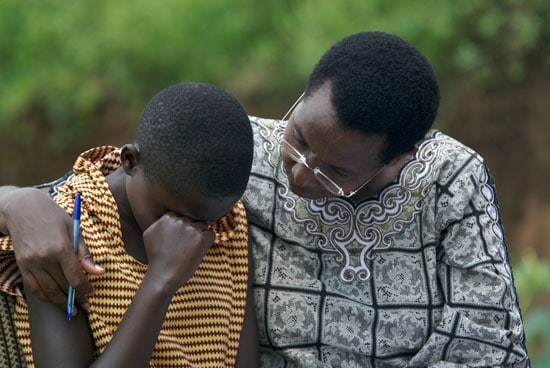
Laurent Mbanda is the Vice President of the Africa region for Compassion and also a native Rwandan. He wrote the book, Committed to Conflict: The Destruction of the Church in Rwanda, about the church in Rwanda and how it was involved in the genocide.
Rwandans had a common saying: ‘God spends the day somewhere else, but spends the night in Rwanda.’ To many, God left Rwanda on 6 April 1994 and did not come back until the final defeat of the Rwandan army by the RPF soldiers.
But not only did God seem to have left, some church leaders seemed to have allowed, blessed and even participated in the slaughter.
According to Mbanda, a history of prejudice and political involvement in the Rwandan church, dating back to Belgian colonial times and early Christian missionaries, set the stage for the unthinkable. Where were God’s people in the Rwandan genocide? Unbelievably, some were right there, supporting it.
What did Haugen do in response to what he saw?
I would have despaired. But fueled by what he saw, Haugen knew what he must do. He knew it was the church’s responsibility, our responsibility, not to wink at the injustices of the world, but to stop them. He founded the International Justice Mission, an organization that secures justice for victims of slavery, sexual exploitation and violent oppression in 12 countries around the world. This organization partners with us to help protect children who might not otherwise have someone to speak up for them.
What is your response when you read about the ugliness of the world? Do you want to close your eyes or just despair? It sure is tempting. But rather than giving up, Haugen went to the Scriptures to see what God’s call was on him, and he obeyed. He is now mobilizing the Church to be the ones who don’t look away, but who show up when the world needs it most.
Photo by Phoebe Graves
We originally published this post on April 6, 2009, the 15th anniversary of the genocide in Rwanda.

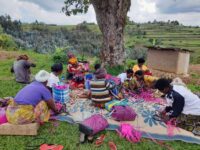
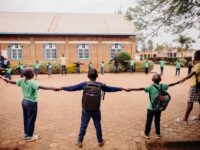
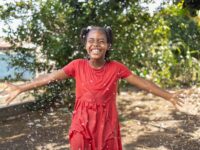
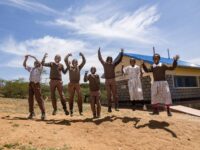


11 Comments |Add a comment
Why would they do this
Hi Amy, I did read “Just Courage” and I was really challenged by it. I recommend it highly!
@ Steve K
I think the “turning the other cheek” has to do with how my response should be when someone mistreats me. It is the response of the individual.
Defending others is in a different category. Standing up for those who cannot defend themselves-widows,orphans,the poor, the weak, etc. In love of course.
Thanks for this post. I actually sponsor a child in Rwanda as a result of that book. She is too young to have lived through it, but I’m sure her parents did. I have no clue which side they were on. To be part of it in any capacity had to be awful.
Sponsoring Kayirngwa is my belated response to that tragedy. I hope that it brings some healing in some way.
Have you read Haugen’s book that came out last summer? It’s called Just Courage . It is a challenge to all of us that God calls us not to be merely safe. Rather, He calls us to be brave. It is very challenging.
I have never been to Rwanda. I think many events in my own life will not make sense this side of heaven. I do know vengeance is the Lord’s and Proverbs 16:33 “Even the things that seem accidental were really ordered by Him.” (Amplified) Jesus knows suffering and death and hell!!! I am thankful Jesus did it for me!!!
I once heard an interesting commentary on turning the other cheek. The verse is Matt. 5:39 and says, “If anyone slaps you on the right cheek, turn to them the other cheek also.” It is right before the famous “Love your Enemies” passage. The interesting thing is the detail of the right cheek. If a right-handed person slaps you on the right cheek, he or she is back-handing you, like someone would treat a slave or subordinate. By turning the left cheek to the person, you are saying, hit me like an equal. Take your fist and punch me, if you dare. I will not be treated like a subordinate. Nor will I respond to you in violence. In a way, Jesus was saying, there is always a third alternative. You don’t have to lie down and take it; nor do you have to fight to prove something. What if the pastors in Rwanda had said, no more, the killing stops here? And were willing to place their lives in the way? What if there had been an Esther or a Mordecai to stand in the gap? You CAN stand up and defend without resorting to violence. It might cost you your life, but it can be done. The hard thing is finding that third way, and having the courage to live it out.
One would hope that we would have learned our lesson after the Holocaust, but apparently that was not the case.
I like to think that I would have the courage to stand up against injustices in the world, even if everyone else is turning a blind eye, and I pray to God that He would give me that courage.
But then if you were able to command God’s people, what would you say?! I struggle with then line of #1 turning the other cheek, or #2 standing up and defending/fighting. I’ve never heard a sermon that clears it up for me, but I know my “emotion” tells me to stand up and defend those who can’t defend for themselves.
Steve, this reply is coming, as you will realize, exactly five years after you left your comment.
Here’s my off-the-cuff response to your struggle: We are told, when someone strikes us on one cheek, to turn the other. But when someone else who is oppressed, an orphan or widow, or who otherwise cannot defend her- or himself, we are to stand up for them.
Of course, there’s what Jesus said about turning the other cheek, and there’s my natural inclination to fight back, if I can. But when we see an injustice, an abuse of child (I don’t care if she’s an orphan, or not) or anyone who is defenseless, oppression of those in poverty or of the weak, God’s mandate seems quite clear.
In February I visited Rwanda for the first time, and met a young man my family had sponsored for 12 years. I’ve had the privilege of leading advocates on Compassion tours for 12 years, but this one left an imprint on me that will never fade.
I read Laurent Mbanda’s book and encourage others to do so to more fully understand what led to the 1994 genocide–western colonialists and the church were much more responsible than “warring tribal factions” as so many of Africa’s conflicts are labeled.
The more incredible story that can truly impact ALL of us is the journey the people of Rwanda have been on over the last 15 years. The illustrations of forgiveness, reconciliation, and restorative justice found in the personal stories of these people, the collective story of this nation, are profound. I recommend that the blog readers pick up a copy of the new book, “As We Forgive” by Catherine Claire Larson, based upon the documentary of the same title. Powerful, convicting, inspiring, hope-filled pages of the personal testimonies of both survivors and perpetrators.
Without the power of God’s mercy and forgiveness, we are indeed a lost people often trapped in ugly circumstances. Because of Christ, we can be a new creation–timely truths as we celebrate Easter!
‘Where are God’s people?’- that is definitely the question. Like you said, I hope the Church, and me personally, can and will “show up” to face the obvious evils of the world.